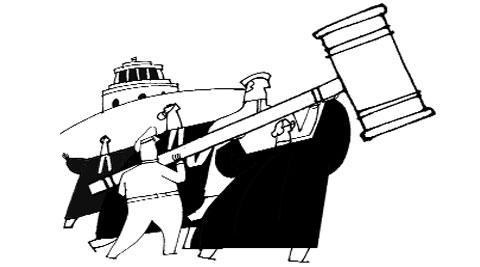Category: Blog
-
Putting expression behind bars!
By Vaishali Mahlyan, University Institute of Law and Management Studies. The concept of Criminal Defamation is a hot piece of cake in front of the Supreme Court. To get an insight, we need to know, “what defamation is?” Defamation is derived from a Latin word ‘Diffamare’ which means ‘spreading evil report about someone’. It causes damage to…
-
Case Summary: IPRS v. Sanjay Dalia and Anr.
By, Sanya Darakhshan Kishwar, Central University of South Bihar (Gaya). Citation: IPRS v. Sanjay Dalia and Anr. MPR 2007 (3) 204, Bench: B. D Ahmed Facts of the case The case is of a dispute regarding territorial jurisdiction of the Delhi High Court in entertaining the suit with regard to the matter of infringement of Copyright Act.
-

An Analysis of Judicial Accountability in India
By Akash Agarwal, Amity Law School, Noida. Accountability and Transparency are the two big-wig cornerstones of any democratic establishment for providing justice to the general public. However, the form of transparency and accountability may vary from one state to another depending upon certain relevant factors. In a democratic country like India, adhering to the concept of separation…
-
Pros and Cons of the RTI Act, 2005
By, Amrita Dasgupta, South Calcutta Law College. An 82 year long movement came to an end in May, 2005 when the Right to Information Act was passed unanimously by both the Houses of Parliament. It is marked as the dawn of a new era. It is a powerful tool for the citizens to know the system better…
-
Malicious Prosecution
By Sudipta Bhowmick, KIIT School of Law, Bhubaneswar. Before you embark on a journey of revenge, dig two graves. –Confucious According to Jurist Blackstones “every man is entitled to have his reputation preserved inviolate”. A man’s reputation is his sacred property. Reputation depends on opinion, and opinion is the main basis of communication of thoughts and Information…
-
Political Parties under RTI: The only way out to fight corruption?
By Shruti Sharma, Campus Law Centre, Delhi University. Right to Information Act, which replaced the erstwhile Freedom of Information Act, 2002, was passed by the Parliament on 15th June, 2005, but it came into force on 12th October 2005. The basic and foremost objective of bringing this act into force was to promote transparency and increase…
-
Salary Revision for the Parliamentarians?
By Anjali Bisht, Law College Dehradun. The news that’s garnered hype nowadays is the proposed hike in the salary for the Members of the Parliament in India. There is no official statement yet given on the said proposal but, the “news” that’s making rounds in the Indian galore is that the Parliamentary panel has set forward a…
-
Digital India Week
By Piyush Jain, Rajiv Gandhi National University of Law, Punjab. Digital India, a flagship programme of the Government of India, aims to “transform India into a digitally empowered society and knowledge economy”. The Digital India programme is transformational in nature and would ensure that Government services are available to citizens electronically. It would also bring in public…
-
Vyapam Scam: An Analysis
By Rashmi Singh, ILS Law College, Pune. The newspapers are once again flooded with the news of a high profile scam breathing for its life in the state of Madhya Pradesh. The recent death of an MBBS student has brought the light on the alleged rigging of the selection process for government colleges and jobs in the…
-
Uniform Civil Code: Still a dream for every Indian?
By Yukti Makan, Symbiosis Law School, Pune. India is a unique country not only in terms of geography but also in terms of its social scenario. It is also a land of various cultures and different religions. The Indian culture believes in Unity in Diversity but unfortunately this Unity in Diversity has not helped to bring political…
